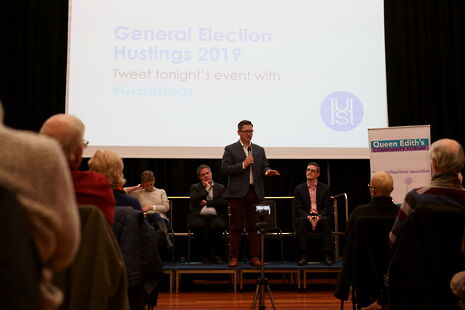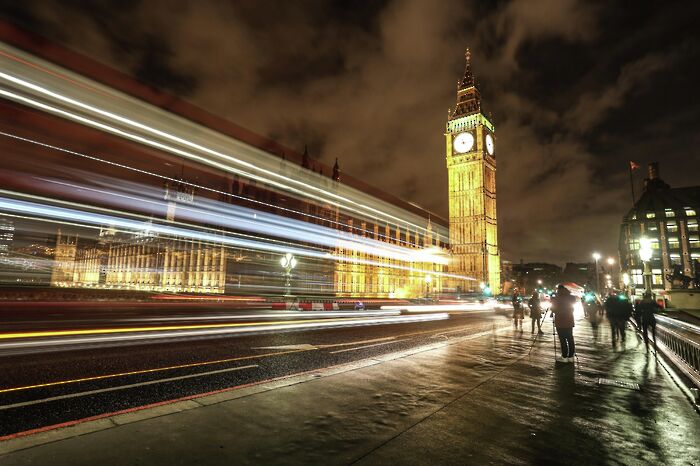NHS, Brexit and climate change dominate South Cambridgeshire election hustings
The Labour, Liberal Democrat and Conservative candidates to replace Heidi Allen as MP met on Thursday at Homerton as December’s election approaches

A hustings held at Homerton on Thursday night and attended by a mixture of students and local constituents saw candidates for the parliamentary seat currently held by Heidi Allen spar over key issues just weeks before the upcoming general election.
The Green Party are not fielding a candidate due to a ‘Unite to Remain’ agreement with the Liberal Democrats and other pro-Remain parties, but the three candidates standing for the seat, Anthony Browne for the Conservatives, Dan Greef for Labour and Ian Sollom for the Liberal Democrats, emphasised the importance of the upcoming election.
Browne described it as “the most important election of a generation”, saying that, “there is a fundamental choice to be made,” while Greef claimed that “the choice is clear: more of the same, or change? I’m standing for change.” He outlined his policies concisely as “stand up for your public services, have the option on Brexit and save the environment.”
South Cambridgeshire’s current MP, Heidi Allen, was elected as a Conservative in 2015 and retained her seat in the 2017 election. In February of this year, however, she left the Conservative Party to join, and later lead, Change UK, a splinter group of former Conservative and Labour MPs. She later resigned from Change UK to sit as an independent in June, before joining the Liberal Democrats in October.
Less than three weeks later, Allen announced that she would not be seeking re-election, citing the “nastiness and intimidation” she had suffered since her defection from the Conservatives.
South Cambridgeshire, the constituency which contains both Homerton and Girton and which voted to remain by 60.2% to 39.8% in 2016, is shaping up to be one of the most closely-fought marginal seats in the approaching 12 December election. Previously considered a Conservative safe seat, polls suggest it could be a close Tory-Lib Dem race.
Brexit
Brexit was, unsurprisingly, high on the agenda for all three candidates, and featured heavily in their opening speeches. Both Greef and the Sollom support remaining in the EU, while Browne repeatedly attacked the Liberal Democrat policy of revoking Article 50, insisting that his stance was “fundamentally a democratic one.”
Greef, conversely, claimed that “democracy is the only answer [to] the executive pushing on the constitution of this country.” In his opening speech, Sollom declared that “This election shouldn’t really be about Brexit - it should be about the climate crisis and millions of people who may be displaced because of the warming of the world,” but that the question of Brexit was stifling all else.
He added that if his party did not come to power, he would support a referendum between Boris Johnson’s deal and remaining in the EU. The only common ground between the Conservative and Liberal Democrat candidates was that Brexit should be dealt with as quickly as possible so that other important issues could be effectively addressed.
The Climate Crisis
Climate change also featured heavily in the debate with Greef describing December’s vote as “the first climate election”, and arguing that the younger generation has a responsibility to future generations to confront the “climate crisis”. He described his party’s plan to reach net zero carbon emissions by 2030 as “the most radical” and said that the UK has “a responsibility to [help] developing countries” deal with climate change and its effects.
Sollom claimed that the Liberal Democrats also have “a radical plan” to tackle climate change, including a pledge of “net zero carbon emissions by 2045” and the argument that the financial benefit that the UK would gain by stopping Brexit would contribute to “boosting renewable energy” and other climate-related incentives.
Browne insisted that he too was “very committed to environmental causes”, citing his previous jobs in the Environment sections of the Times and Observer and claiming that he drives an electric car. He spoke about the actions of the current Conservative government, although conceding that “we need to be more radical.”
The NHS
All candidates emphasised their commitment to local as well as national politics, singling out transport, education and the NHS as the most important local issues. When questioned as to the extent to which they would be local MPs, standing up for their constituents, potentially against their own parties, Sollom declared that he was “following in [Heidi Allen’s] footsteps”, while Greef stated his commitment to “a democracy on every level of society” and Browne, after criticising Heidi Allen’s defection from his party, claimed that it was “important that MPs protect constituents.”
Arguably the issue that received the most debate and discussion overall was the NHS. All three men criticised the underfunding of the NHS and the strain on healthcare professionals and resources, while declaring their commitment to improving the NHS in South Cambridgeshire and across the UK in general. Greef mentioned several times his concern about the impact of a possible post-Brexit trade deal with Trump’s America on the NHS and public health.
The student who attempted to question Boris Johnson during his visit to Addenbrooke’s several weeks ago posed a question to the candidates about their policies on the NHS. Browne told the audience it was “very important that everyone has equal access to the NHS”, while Greef laid out Labour’s policy of “tak[ing] back all services under national control” and “ending privatisation in the NHS.” Sollom stated that “the NHS issue is a Brexit issue” and that his proposed “Remain bonus”, funds gained if the UK remained in the EU, would, in part, go towards “funding the NHS properly so it can deliver [better standards of] care.”
Racism
Among the other questions asked, Browne was challenged about “racist, islamophobic and anti-immigrant comments” comments that he had written for the Spectator in 2002 and 2003. Responding that “the articles were 17 years ago and I have apologised for them”, he insisted he was “pro-immigration”, adding that his wife was an immigrant and that “racism is completely and utterly unacceptable in all its forms.” In defence of his comments, he added that “the function of a journalist is to provoke debate” whereas “the function of a MP is to bring people together.”
Browne also came under fire for the recent “factcheckUK” scandal, in which the Conservative Party’s official Twitter re-branded itself as an official fact-checking account and tweeted in support of Boris Johnson during a recent televised debate between the Prime Minister and Jeremy Corbyn. Browne claimed that “[the account] did clearly say it was from CCHQ” and that “we will need some sort of government action to stop fake news” in the future. This prompted Greef to comment that “this election is really dirty because Vote Leave is in Downing Street” and that “tighter regulation” was needed to combat fake news. Greef himself was also questioned about the “institutional anti-Semitism” in the Labour Party.
Other issues discussed involved gender and trans rights, the question of international law regarding the Israeli-Palestinian situation, the police force and funding for international students.
The candidates were asked whether they supported the upcoming UCU strikes; all three declared their support for the right to strike, but only Greef and Sollom explicitly claimed to support the strike in question.
 News / Eight Cambridge researchers awarded €17m in ERC research grants27 December 2025
News / Eight Cambridge researchers awarded €17m in ERC research grants27 December 2025 News / Clare Hall spent over £500k opposing busway 24 December 2025
News / Clare Hall spent over £500k opposing busway 24 December 2025 Comment / League tables do more harm than good26 December 2025
Comment / League tables do more harm than good26 December 2025 News / Caius mourns its tree-mendous loss23 December 2025
News / Caius mourns its tree-mendous loss23 December 2025 Comment / The ‘class’ of Cambridge24 December 2025
Comment / The ‘class’ of Cambridge24 December 2025










